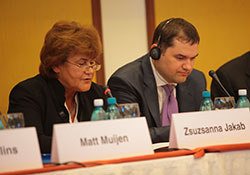Intellectual disability: Conference on children and young people with intellectual disabilities

WHO
26-27 November 2010, Bucharest, Romania
Young children with intellectual disabilities are an extremely vulnerable group often subjected to discrimination and neglect. There is consensus that health is a key determinant of their development and social inclusion, and that good quality health care is a means of reducing health inequalities, promoting good health and well-being and ensuring a successful transition to adulthood.
WHO supports the inclusion of children with intellectual disabilities through the initiative Better health better lives: children and young people with intellectual disabilities and their families. This initiative aims to ensure that all children and young people with intellectual disabilities are fully participating members of society, living with their families, integrated in the community and receiving health care and support proportional to their needs. The initiative was launched at the Conference in Bucharest, Romania 26 – 27 November 2010, in partnership with UNICEF and resulted in the declaration that covered 4 key objectives:
- promoting and supporting good physical and mental health and well-being;
- eliminating health and other inequalities and preventing other forms of discrimination, neglect and abuse;
- providing support that prevents family separation and allow parents to care for and protect children and young people with intellectual disabilities;
- supporting children and young people in the development of their potential and the successful transitions through life.
Examples of good practice
The Conference also showcased examples of good practice from across the European region, particularly in the areas of de-institutionalization, development of family support services, delivery of health promotion programmes and specialist support services. The roles of governance, workforce development and quality assurance were addressed.
Achieving long-term objectives
To achieve the long-term objectives of this initiative, the Conference provided a forum for planning follow-up activities and establishing partnerships to work together towards implementing the declaration at Regional, national and local levels.
WHO thanks Shirley Foundation for its generous support to this Conference.
The Resolution on the WHO European Declaration and Action Plan on the Health of Children and Young People with Intellectual Disabilities and their Families was adopted at the sixty-first session of the Regional Committee for Europe. Please see the Resolution under "See also" to the right.



